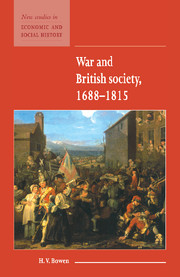Book contents
- Frontmatter
- Contents
- Acknowledgements
- 1 Introduction
- 2 Eighteenth-century warfare: the British experience
- 3 Taking the strain: state and society
- 4 A nation in arms: the armed forces and British society
- 5 The wartime economy
- Afterword
- Bibliography
- Index
- More titles in the New Studies in Economic and Social History series
- More titles in the Studies in Economic and Social History series
- Economic History Society
2 - Eighteenth-century warfare: the British experience
Published online by Cambridge University Press: 05 June 2012
- Frontmatter
- Contents
- Acknowledgements
- 1 Introduction
- 2 Eighteenth-century warfare: the British experience
- 3 Taking the strain: state and society
- 4 A nation in arms: the armed forces and British society
- 5 The wartime economy
- Afterword
- Bibliography
- Index
- More titles in the New Studies in Economic and Social History series
- More titles in the Studies in Economic and Social History series
- Economic History Society
Summary
Between 1688 and 1815 England, or (after 1707) Britain, participated in seven major international wars in Europe and the wider world. Such was the recurrent and sustained nature of conflict with France and Spain that some modern historians have used the term the ‘Second Hundred Years War’ to describe the period (Meyer and Bromley, 1980), even if this is inaccurate in view of a lengthy period of Anglo-French co-operation between 1716 and 1730 (Black, 1985: 1–12). Nevertheless, as D. B. Horn, the diplomatic historian, once observed, the peace treaties of the eighteenth century represented little more than ‘mere truces’ in the on-going struggle for supremacy being waged between Britain and France (quoted in Emsley, 1979: 4).This comment echoes the prediction made by Pitt the Elder in 1763 that the Peace of Paris would be an ‘armed truce only’ (Simmons and Thomas, 1982, I: 441). Pitt was grinding a political axe when he made this remark, but he was acknowledging that all periods of eighteenth-century peace were uneasy times, when finances were repaired and military losses made good in readiness for the next, inevitable conflict.
During these years of war and peace Britain's status and standing among the European powers was not only transformed, but its overseas empire, trade, and commerce expanded. Much to the surprise of many contemporaries, and in spite of serious setbacks such as the loss of the North American colonies in 1783, British forces secured victories on land and sea that enhanced Britain's reputation in Europe and led to its steady ascendancy through the ranks of the great powers.
- Type
- Chapter
- Information
- War and British Society 1688–1815 , pp. 5 - 19Publisher: Cambridge University PressPrint publication year: 1998



